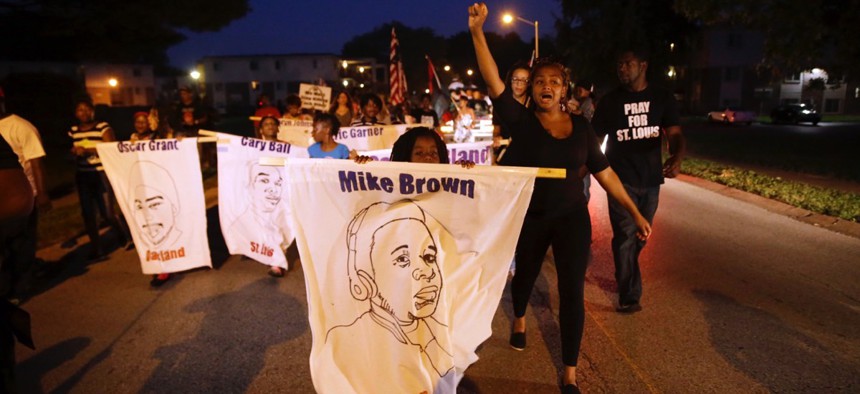Ferguson Releases Draft DOJ Agreement Meant to Guide Policing, Court Reforms

Protesters march down Canfield Drive in August near where Michael Brown was killed by a police officer in Ferguson, Missouri. Jeff Roberson / AP Photo

Connecting state and local government leaders
The city is seeking public feedback in advance of an expected City Council vote on Feb. 9 on whether to proceed with the consent decree.
After negotiations that spanned seven months, Ferguson, Missouri on Wednesday released a draft agreement officials there have reached with the U.S. Department of Justice, which is meant to resolve a federal investigation into the city’s police department and municipal court.
Some of the areas related to the Ferguson Police Department that the 131-page preliminary agreement, or consent decree, covers are: community engagement, bias-free policing practices, officer use of force, the use of body-worn cameras, police recruitment and data collection.
Along with other goals, the agreement seeks to revise the city’s municipal code to ensure it is aligned with the Constitution and to guarantee that the local court respects people’s rights. That’s according to a letter Vanita Gupta, a principal deputy assistant attorney general with the Justice Department sent Tuesday to the Ferguson’s mayor and City Council.
“The ability of a police department to protect the community it serves is only as strong as the relationship it has with that community,” the draft agreement’s introduction states.
It goes on to add: “The provisions of this Agreement are meant to ensure protection of the constitutional and other legal rights of all members of the community, improve Ferguson’s ability to effectively prevent crime, enhance both officer and public safety, and increase public confidence in the Ferguson Police Department.”
Examples of specific requirements included in the tentative pact are: structuring individual officers’ patrol areas around neighborhood boundaries and requiring them to periodically carry out patrols on foot or bicycle; providing officers initial and ongoing use of force training that covers de-escalation techniques; and equipping all patrol officers, patrol supervisors, and jail workers with body-worn cameras and microphones that they will wear while on duty.
A statement the city issued on Wednesday called the negotiations with the Justice Department “hard fought.”
The Department of Justice investigated Ferguson’s criminal justice system after an unarmed black 18-year-old, Michael Brown, was shot and killed by a white police officer, Darren Wilson, on Aug. 9, 2014. Brown’s death led to unrest in the city of about 21,000, which is located on the northwest outskirts of St. Louis. The incident, along with others, also sparked an ongoing, national debate about issues tied to law enforcement and race.
A report issued last March presented the findings of the Justice Department investigation.
It said that the law enforcement practices in Ferguson were shaped by the city’s focus on generating money, rather than by public safety. This, the report said, contributed to a pattern of of unconstitutional policing and problematic court procedures. Also noted was that the city’s criminal justice system was laden with racial bias, particularly toward African Americans.
In its statement on Wednesday, the city said it wants public input on the draft consent decree. A bill that would allow for the city to take action on the proposed agreement is set to be introduced at Ferguson’s City Council meeting on Feb. 2. A Council vote is currently expected on Feb. 9.
Once Ferguson and the Justice Department arrive at a final agreement, the consent decree would be filed in federal court.
After it becomes effective, the city and the Justice Department would select an independent “monitor” to assess and report on the Ferguson Police Department’s progress complying with the agreement. Their selection of a monitor would be subject to court approval.
Since the 1990s, processes akin to the one now unfolding between the Justice Department and Ferguson have played out in places around the country, including cities such as New Orleans and Seattle. Law enforcement agencies in each of those cities, and other jurisdictions, faced federal scrutiny over their practices, and are now in the process of carrying out reforms to comply with the terms of agreements they have entered into with the U.S. government.
Meeting those terms can take years and typically requires substantial sums of money to pay for expenses such as officer training and computer upgrades to improve record-keeping.
Ferguson’s finances are strained. Moody’s Investors Service downgraded the city’s credit rating to junk last year. Among the factors the ratings agency noted at that time were rising costs tied to litigation and the pending agreement with the Department of Justice.
Bill Lucia is a Reporter with Government Executive's Route Fifty.

NEXT STORY: Mapping Local Nutrient Pollution Through Citizen Science





